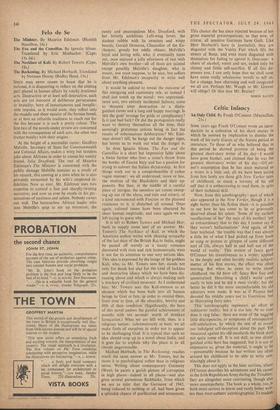tempting to put criticism aside, and give it puffs
BRIAN INGLIS
Sunday Painters
Modern Primitives. By Oto Bihalji-Merin. (Thames and Hudson, 4 gns.) IT had to come, I suppose : a very intense, fat little book on naïve painters. With Henri Rousseau as the grand point of departure and of illumination—or obfuscation—the naive had sooner or later to be solemnly assembled and contrasted with the poverty of 'civilised' vision, and sentimentally discussed in relation to the collective soul, the 'primal ground of being,' 'buried instincts', and 'bridging the gap between the visible and invisible,' with attendant psycho- logical-quotations.
My first response, after looking through the many illustrations, in colour and monochrome, was one of boredom, then irritation. Naive painters from France. Yugoslavia, from Ger- ' many, Italy, Russia, Spain, and everywhere (inside the Western idiom)—all of them with only one element in common, their naive, approxi- mate, mainly home-made technique, the one thing which connects the riff-raff of Sunday painting—i.e. 90 per cent. of the painting dis- cussed and so well reproduced in this book— with the vision of Henry Rousseau, or Louis Vivin, or Mitelli, the Italian shoemaker.
Names and Images
Weep Before God. By John Wain. (Macmillan, 12s. 6d.) The Sun My Monument. By Laurie Lee. (Chatto, 12s. 6d.) Title Deeds. By Frederick Grubb. (Longmans, 15s.) The Distances. By Charles Olson. (Evergreen Books, 13s.) THE gravestone has now been so firmly put in place above the 1950s Movement—helped even by those who made it respectable at the time— that it perhaps needs pointing out that some of the poems in New Lines were and are very good, and that none of them was or is very bad. One of the prime architects of the Movement has always been taken to be John Wain, who smoothed and sharpened the Empson villanelle and terza rima so that they became elegant moral instruments. Of course they lost something in the process—Empson's baleful, murky quality, among other things—but I still find some pleasure in the clinching lines of the poems- in A Word Carved on a Sill.
I find greater pleasure, however, in some of
the work in his new book. Almost all of it has been broadcast or published in magazines during the last three years, so it doesn't come as a shock to find that Wain has moved away from Empson and towards D. H. Lawrence. Some of the best parts of Weep Before God could hardly have been written without Lawrence's example, though they are certainly not directly derivative. I'm thinking of 'Au Jardin des Plantes.Anniver- sary,' and the second and fourth sections of 'A Song about Major Eatherly.' This last poem, now deservedly well known, is Wain's most ambitious and (despite flaws in the other two sections) most successful poem so far. It makes me realise how wrong I was to judge. on the evidence of A Word Carved on a Sill. that he was a poet who couldn't manage freer forms, who needed a metrical cage to contain his real poetic self. Wain's natural vigour sometimes lets him down badly, as in the long 'Boisterous Poem about Poetry,' which has far too much of the tedious frenetic screeching one finds in some of his fiction; but altogether Weep Before God is a marked advance on his earlier work.
Laurie Lee's publishers have apparently
thought the time ripe to remind us that the author of Cider with Rosie is a poet; and they have done this by reissuing his first book of poems, originally published in 1944. It seems to me that they do him no great service by this. Lee's out- put has always been small, and the work itself has been slight, but he has a gift for vivid metaphor which became impressive with an added technical skill in The Bloom of Candles (1947) and My Many-Coated Man (1955): I think of 'Sunken Evening' and 'Apples': They lie as wanton as they fall, and where they fall and break, the stallion clamps his crunching jaws, the starling stabs his beak.
The early poems, however, for all their 'colour- ful' language, are much less successful. Too many of them sound like arbitrary translations of Lorca or Neruda, with the rather loony whimsy which such poems seem to have in English:
And the day I observed that I was a lover I crossed the frontier to seek a wound and fell with a fever above the Bahia de Rosas letting the mad snow spit in my eyes.
The little selection of Lee's work in the 'Pocket Poets' series, published much more cheaply, gives a better offering of this pleasant, unpretentious poet. I scarcely know what to make of Frederick Grubb's poems in Title Deeds. Mr. Grubb gave some clues in a duplicated letter he distributed to friends and fellow-poets before the book's publication, but even it doesn't seem to help much. The literary and historical cross-references in the poems, the epigraphs .from Leopardi, Rilke and Valery (among others), kept me reach- ing far too hotly for the bookshelves. But more often what has held me up has been syntactical fussiness, crabbed metrics, a curiously tongue- twisting diction, all presented with obvious care and seriousness but without any clear impulse. One can hardly demonstrate without quoting a whole poem, but a single stanza (from 'Midi : Decision to Leave') may show some of the difficulties:


































 Previous page
Previous page